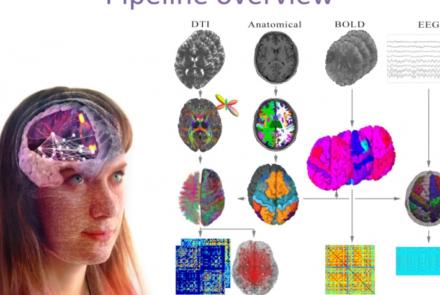Lesson type
Difficulty level
This lecture presents the Graphical (GUI) and Command Line (CLI) User Interface of TVB. Alongside with the speakers, explore and interact with all means necessary to generate, manipulate and visualize connectivity and network dynamics.
Difficulty level: Beginner
Duration: 1:02:16
Speaker: : Paula Popa & Mihai Andrei
This lecture briefly introduces The Virtual Brain (TVB), a multi-scale, multi-modal neuroinformatics platform for full brain network simulations using biologically realistic connectivity, as well as its potential neuroscience applications (e.g., epilepsy cases).
Difficulty level: Beginner
Duration: 8:53
Speaker: : Petra Ritter
This lecture introduces the theoretical background and foundations that led to the development of TVB, its architecture, and features of its major software components.
Difficulty level: Beginner
Duration: 46:50
Speaker: : Randy McIntosh
This lecture presents selected theories of ethics as applied to questions raised by the Human Brain Project.
Difficulty level: Beginner
Duration: 38:49
Speaker: : Christine Mitchell
The HBP as an ICT flagship project crucially relies on ICT and will contribute important input into the development of new computing principles and artefacts. Individuals working on the HBP should therefore be aware of the long history of ethical issues discussed in computing. This lessson provides an overview of the most widely discussed ethical issues in computing and demonstrate that privacy and data protection are by no means the only issue worth worrying about.
Difficulty level: Beginner
Duration: 46:12
Speaker: : Bernd Stahl
This lecture explores two questions regarding the ethics of robot development and use. Firstly, the increasingly urgent question of the ethical use of robots: are there particular applications of robots that should be proscribed, in eldercare, or surveillance, or combat? Secondly, the talk deals with the longer-term question of whether intelligent robots themselves could or should be ethical.
Difficulty level: Beginner
Duration: 31:35
Speaker: : Alan Winfield
In this lesson, attendees will learn about the challenges involved in working with life scientists to enhance their capacity for understanding, and taking responsibility for, the social implications of their research.
Difficulty level: Beginner
Duration: 50:15
Speaker: : Nikolas Rose
This lecture considers some of the key social and ethical issues raised by the ‘big brain projects’ currently under way in Europe, the USA, China, Japan, and many other regions.
Difficulty level: Beginner
Duration: 53:08
Speaker: : Nikolas Rose
This lecture aims to give an introduction and overview of the dual-use challenge as it applies to neuroscience today and will apply in coming decades.
Difficulty level: Beginner
Duration: 40:11
Speaker: : Malcolm Dando
What is ethics in biomedical research? In this case, ethics refers to how we think we can use animals in biomedical research and what we gain from the experimental setup of those investigations. We will talk about “a common set of values” and how 3R engagement can make a difference in experimental procedures, results, and scientific publications of the future.
Difficulty level: Beginner
Duration: 51:04
Speaker: : Viveka Hillegaart
This lecture discusses how artificial intelligence (AI) is presented in policy documents as a disruptive and transformative technology. The talk will further elaborate on how policy-makers frame social risks and opportunities associated with AI in areas such as employment, business, healthcare, education, and military.
Difficulty level: Beginner
Duration: 55:13
Speaker: : Rafael Frias
This lesson provides a high-level overview of the ethical issues related to data use in such a large, complex, and multi-national research initiative as the HBP.
Difficulty level: Beginner
Duration: 58:18
Speaker: : Manuel Guerrero
This lecture explores the morally relevant aspects of cognitive enhancement, with special emphasis on safety, fairness, authenticity, and coercion (peer pressure). It will also touch upon the less-widely discussed issue of moral status and cognitive function.
Difficulty level: Beginner
Duration: 57:53
Speaker: : Sebastian Porsdam Mann
This talk attempts to answer the question “how intelligent are present-day intelligent robots?” and describe efforts to design robots that are not only more intelligent but also have a sense of self. But if we should be successful in designing such robots, would they think like animals, or even humans? And what are the realistic prospects for future (sentient) robots as smart as humans?
Difficulty level: Beginner
Duration: 53:27
Speaker: : Alan Winfield
This presentation accompanies the paper entitled: An automated pipeline for constructing personalized virtual brains from multimodal neuroimaging data (see link below to download publication).
Difficulty level: Beginner
Duration: 4:56
This lecture provides an overview of successful open-access projects aimed at describing complex neuroscientific models, and makes a case for expanded use of resources in support of reproducibility and validation of models against experimental data.
Difficulty level: Beginner
Duration: 1:00:39
Speaker: : Sharon Crook
This lecture on model types introduces the advantages of modeling, provide examples of different model types, and explain what modeling is all about.
Difficulty level: Beginner
Duration: 27:48
Speaker: : Gunnar Blohm
This lecture summarizes the concepts introduced in Model Types I and further explains how models can be used answer different scientific questions.
Difficulty level: Beginner
Duration: 32:30
Speaker: : Megan Peters
Course:
This lecture focuses on how to get from a scientific question to a model using concrete examples. We will present a 10-step practical guide on how to succeed in modeling. This lecture contains links to 2 tutorials, lecture/tutorial slides, suggested reading list, and 3 recorded Q&A sessions.
Difficulty level: Beginner
Duration: 29:52
Speaker: : Megan Peters
Course:
This lecture formalizes modeling as a decision process that is constrained by a precise problem statement and specific model goals. We provide real-life examples on how model building is usually less linear than presented in Modeling Practice I.
Difficulty level: Beginner
Duration: 22:51
Speaker: : Gunnar Blohm
Topics
- Artificial Intelligence (5)
- Philosophy of Science (5)
- Notebooks (1)
- Connectomics (1)
- protein-protein interactions (1)
- Extracellular signaling (1)
- Animal models (2)
- Assembly 2021 (28)
- Brain-hardware interfaces (13)
- Clinical neuroscience (11)
- International Brain Initiative (2)
- Repositories and science gateways (6)
- Resources (6)
- General neuroscience
(12)
- General neuroinformatics
(5)
- (-) Computational neuroscience (68)
- Statistics (1)
- Computer Science (5)
- (-) Genomics (2)
- Data science (9)
- Open science (12)
- Project management (6)
- Education (1)
- (-) Neuroethics (27)




















